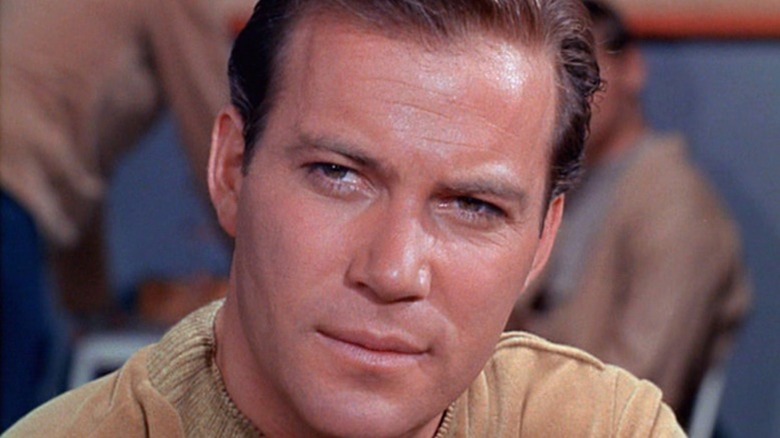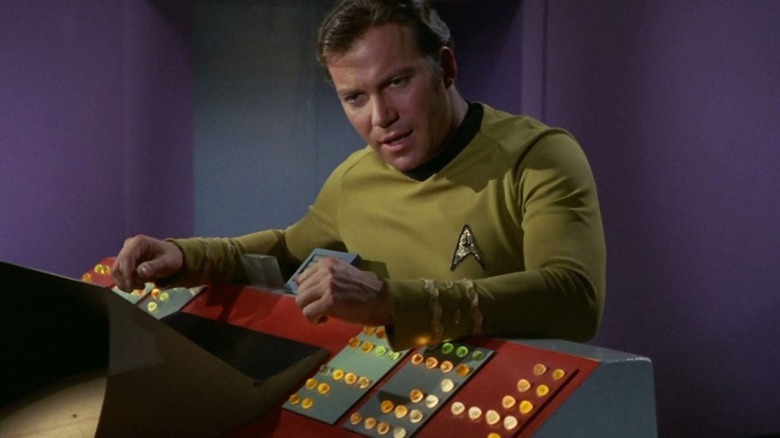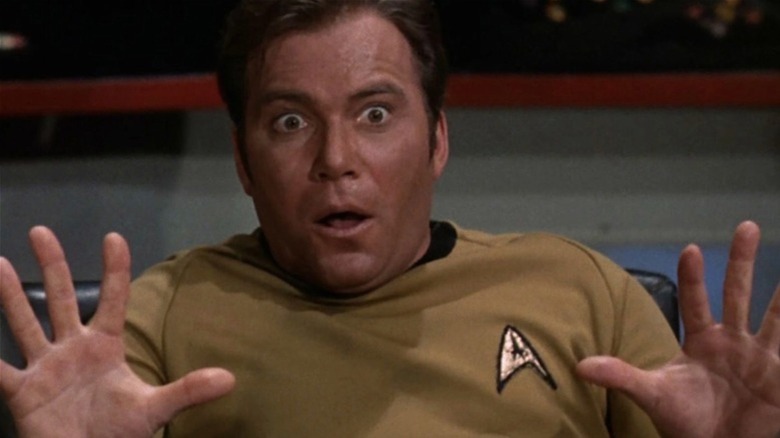William Shatner Led A Coup Against The Directors Of Star Trek Season 2
You might've heard over the years that William Shatner has a propensity for diva behavior, both on and off set. He could be controlling, selfish, and downright insulting. He's been accused of stealing lines and generally being a jerk to his "Star Trek" cast mates. James Doohan, who endeared himself to fans as the Enterprise's chief engineer Scotty, once remarked, "I wanted to thump him on more than one occasion." At a roast held in Shatner's honor, Nichelle Nichols, a television legend for her portrayal of Black communications officer Lieutenant Uhura, joked, "People say you're a pompous, arrogant, egotistical, self-centered, narcissistic jerk. I don't think you're narcissistic."
Obviously, the cast learned to deal with Shatner being Shatner, which allowed them to hang together for several decades and six feature films. They all made a good deal of money milking "Star Trek" for every cent it was worth, and thank god they did because the world needed a science fiction franchise that burst with such intelligence and hope.
Still, for those charged with directing Shatner, there have been times when his meddlesome ways have made their life, and the task of completing an episode or movie, incredibly difficult. This stretches all the way back to the production of the original series in the late 1960s, particularly the second season. Shatner had settled into the role of Captain James T. Kirk and desired input into the writing of the scripts. In doing so, he challenged the authority of the series' directors, which led to a fraught atmosphere on set.
Shatner gets under the hood
According to Edward Gross and Mark A. Altman's "The Fifty Year Mission: The Complete, Uncensored, Unauthorized Oral History of 'Star Trek:' The First 25 Years," the trouble started when the actors asked for a rehearsal table, which would enable them to contribute to the shaping of their characters. Director Joseph Pevney believes this was spurred on by Shatner, but it's worth noting that he was not alone in suggesting rewrites. Leonard Nimoy, who played the Vulcan Science officer Spock, also had ideas about the show's direction.
For Pevney, actors making contributions wasn't the problem; it was the approach. As he told Gross and Altman, "Leonard could make his contributions in a quiet way by going into the office and talking to [producer Gene L.] Coon or [series creator Gene] Roddenberry, and they were all very receptive." With Shatner, however, there was a significant shift in the on-set power dynamic. Per Pevney:
"So like a producer himself, Bill would arrange the table and seats and he would talk to the property man to move things over to the side. Well, when you're doing television in five or six days, or whatever the schedule was back then, there's no time for this constant rehearsal, a reading rehearsal, offstage, with pencils in hand and making changes. Because once you start making changes on the set, they have to be approved by the producer."
This forced Roddenberry to issue a memo that diplomatically acknowledged the positive aspects of the actors' script contributions while warning against too much interference. His missive ended thusly:
"[O]bviously none of us want this to become a habit since it is precisely this type of thing which has destroyed the format and continuity of more than one television series... where one person makes a change, others who may be less capable are encouraged to stick in their oar too, the director is encouraged to toss in some ideas of his."
Turning directors into glorified errand boys
Pevney didn't like this one bit.
"It destroys the most important thing of all, the disciplinary control of the director on the set. It's a very critical and tentative thing, which the television industry has gone away from completely. The director on a television set is nothing anymore. He doesn't mean a goddamned thing. He's an errand boy. I'm an angry guy when it comes to this kind of s***. I come from a disciplined school where everything is in the script. Nothing else counts."
Associate producer Robert H. Justman, however, believed this process had value. "It was useful," he said. "It certainly helped a lot." But it also ended up being too much. As Justman said to Gross and Altman:
"I don't think Leonard or Bill ever gave up wanting to make the show better. Especially Leonard. He always wanted to make it better, make his character more believable, and not take the easy way out. The problem is, of course, that the actors get the script a few days before they start the shooting, and then it's a little late to try and effect changes. We did try to accommodate them as much as we possibly could, even though it made our lives hell. There wasn't any time."
While it sounds like the process of shooting a "Star Trek" episode wasn't much fun, you'd never guess there was behind-the-scenes drama from watching the episodes. The ensemble had amazing chemistry, and the stories, concocted by masters like Richard Matheson and Harlan Ellison, were uncommonly brainy for network television at the time. Hopefully, everyone involved in crafting those brilliant three seasons of television could eventually overlook the contentiousness and be proud of their exceptional work.


